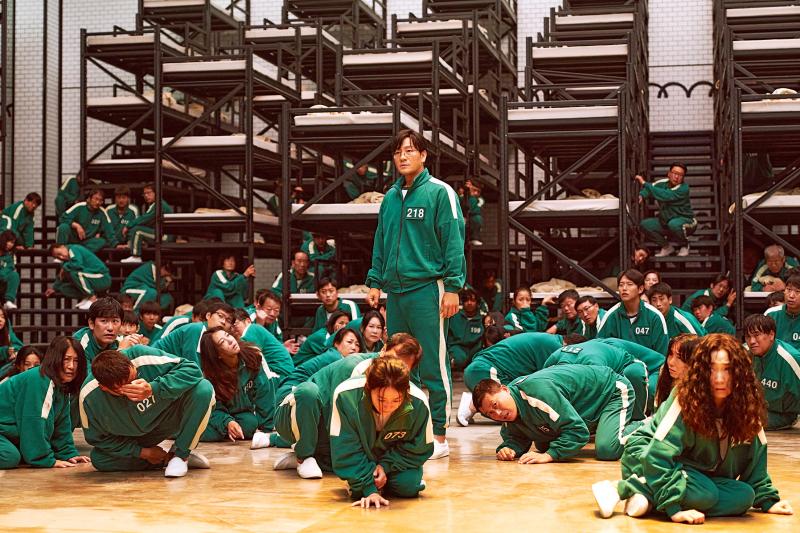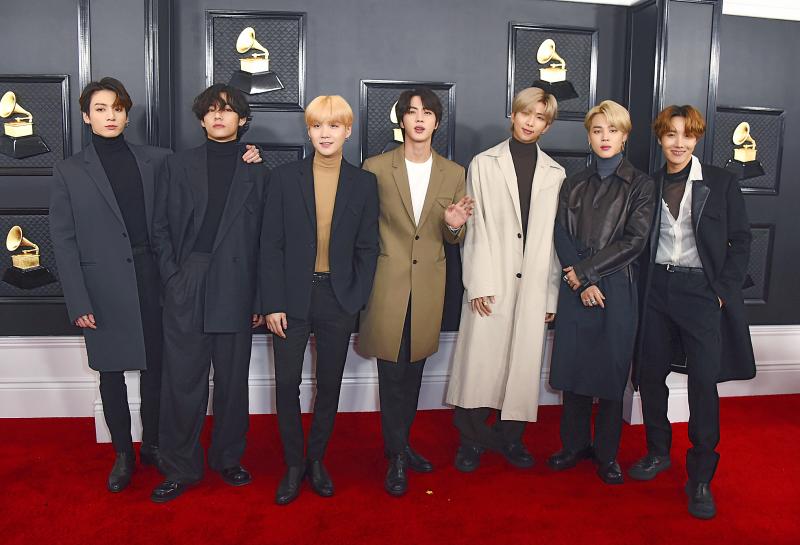South Korean films and TV series have in the last few years rapidly swept across the cultural scenes of Asia, Europe and the US. South Korean culture has become so popular that the Oxford English Dictionary (OED) last month added 26 Korean words to its latest edition.
According to reporting by CNN, the term “K-pop” was added to the OED’s corpus in 2016 following two decades of South Korean idol groups and pop music taking the world by storm and garnering millions of fans in the process.
In addition to pop music, South Korean film and TV drama has built a global presence, including last year’s multi-award-winning smash hit Parasite and the recently-released Squid Game, which is set to become Netflix’s biggest-ever show. The word “K-drama” was one of the Korean words added to last month’s OED update.

Photo courtesy of Netflix 照片:網飛提供
Also included in last month’s update was hallyu, which means “Korean wave” and refers to the global phenomenon of South Korean culture sweeping the globe. The popularity of South Korean popular culture has driven interest in South Korean tourism and food culture. Accordingly, new additions to the OED corpus include banchan (small side dishes of vegetables served as part of a larger meal) and bulgogi (Korean-style barbecued beef). Other additions include hanbok (traditional Korean clothing), aegyo (coquettish behavior considered adorable in Korean culture) and mukbang (a self-made video of someone eating food while talking to the camera). Some existing English words that have taken on a new meaning through South Korean culture have also been included in the dictionary’s update, such as “fighting,” which has been adapted by South Koreans as an encouragement to others, similar in meaning to“keep going” or “go for it.”
A statement released by the OED said: “We are all riding the crest of the Korean wave, and this can be felt not only in film, music, or fashion, but also in our language, as evidenced by some of the words and phrases of Korean origin included in the latest update of the Oxford English Dictionary.” The statement continued: “The adoption and development of these Korean words in English also demonstrate how lexical innovation is no longer confined to the traditional centers of English in the United Kingdom and the United States.”(Liberty Times, translated by Edward Jones)
韓國影視產業近年以風馳電掣,先後橫掃亞洲和歐美文化圈,流行的程度就連牛津英語辭典都在九月的詞目更新中,增加了二十六個韓式英文單字。

Photo: AP 照片:美聯社
《CNN》報導,南韓過去二十年以大量偶像團體和流行歌曲風靡全球數百萬粉絲,「K-pop」一字也在二○一六年被收錄進牛津字典中。
除了流行音樂外,南韓電影和戲劇也走上全球舞台,包括去年橫掃各大影展獎項的《寄生上流》,以及近日爆紅,有望成為網飛(Netflix)最受歡迎影集的《魷魚遊戲》等,「K-drama」也被列為此次的牛津新字。
牛津字典的新一波更新中,加入了描述南韓風潮的用語「韓流」(hallyu)一詞。文化流行也帶動了該國的觀光和飲食文化,包括「飯饌」(韓式小菜,banchan)、「韓式烤牛肉」(bulgogi)等,以及「韓服」(hanbok)、「撒嬌」(aegyo)和「吃播」(mukbang),另外有一些是由韓國文化賦予新意的現存單字,像是「fighting」被用於鼓勵和加油。
牛津字典聲明寫道,「我們都馳騁在南韓浪潮的浪尖上,且不只是在電影、音樂和流行文化上,還包含了語言,從我們最新一次更新中看見的韓式單字和片語可見一斑」、「韓式英文的發展和採用也證明了一件事,那就是詞彙的創造不再侷限於美國和英國兩大傳統英語中心。」
(自由時報)

After steel and aluminum, US President Donald Trump has set his sights on slapping 25 percent tariffs on semiconductors, cars and pharmaceuticals. Trump has already slapped additional 10 percent tariffs on goods from China and has also threatened tariffs on Canada and Mexico, plus ordered a study into putting into place reciprocal tariffs. Here’s a look who would be hit the hardest if US import tariffs on semiconductors, cars and pharmaceuticals go into force. SEMICONDUCTORS: ASIA IN THE CROSSHAIRS Semiconductors, or microchips, are the brains in our electronic devices and demand has soared with the development of AI, which

Noise pollution is a frequently underestimated environmental hazard. While hearing loss is the best-known outcome associated with noise, emerging research is uncovering how noise affects our health in other ways. From impaired memory and sleep disturbances to cardiovascular problems, the impact of noise is profound. For a start, unpleasant or excessively loud sounds can lead to stress and divert attention. Even everyday noises, such as those caused by traffic, lawnmowers, and construction work, can interfere with cognitive functions and elevate stress levels. “Our ears capture sound, but we hear with our brains,” explains Wei Sun, an audiology researcher at

Nestled within the heart of Taipei, National Taiwan University (NTU) contains a grand and spacious sanctuary where nature and academia come together in perfect accord. Across its expansive 111-hectare campus, NTU reveals a landscape rich with history, lush greenery, and a thoughtfully preserved ecosystem. This tranquil haven invites visitors to take their time wandering among the elegant buildings, to admire the rare plants, and to experience a space that exudes quiet inspiration. Zhoushan Road: A Gentle Prelude to NTU’s Tranquility Beginning at Gongguan MRT Station, the enchanting avenue Zhoushan Road leads visitors into NTU shaded by golden rain trees, cottonwoods, and Javanese

Continued from yesterday(延續自昨日) https://www.taipeitimes.com/News/lang 本文由生成式AI協作,本刊編輯編修。 Strolling along the old streets in Yunlin is like taking a journey back in time because they are dotted with charming historical buildings that reflect the county’s prosperous past. Among its famous old streets, Siluo Old Street stands out as a beautifully preserved historical area. This street is home to many baroque-style buildings that were constructed in the 1930s, when the region was a thriving commercial hub under Japanese colonial rule. Today, it retains much of its original charm, with traditional shops, tea houses, and snack vendors offering a nostalgic experience to both locals and visitors. While the county